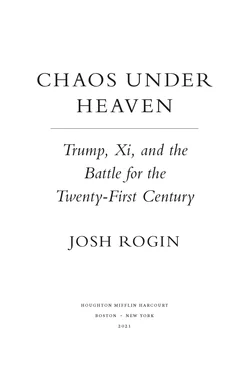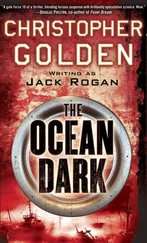Pottinger quoted Confucius from The Analects, first in Chinese and then translated to English: “If names cannot be correct, then language cannot be in accordance with the truth of things. And if language cannot be in accordance with the truth of things, then affairs cannot be carried on to success.”
The United States and China were obviously in competition with each other, he said, and there was no benefit to avoiding saying that out loud. By presenting the Trump administration’s policy as one of honesty and realism, he sought to dispel the Chinese ambassador’s notion that Washington was somehow the aggressor. “For us, competition is not a four-letter word,” he said.
Pottinger was trying to call out the change in climate in US-China relations, but he was not senior enough to really break through. That’s why he and other like-minded officials pushed for a major speech on China to be delivered by the most senior official the hardliners counted as one of their own, Vice President Pence.
Pence on China
Pence had kept up a steady role on foreign policy, traveling to the Munich Security Conference in 2017 and touring Asia in early 2018. I traveled with him to the opening ceremony of the Winter Olympics in Pyeongchang, where he sat feet away from Kim Jong Un’s sister but never made eye contact. We traveled to the border and peered over into North Korea. Pence was a true neocon from way back in his congressional days. I once asked him, just to see what he would say, if he thought the CCP was a “fascist” organization. He replied, “No, they’re Communists.” He saw the CCP similarly to how he once viewed the Soviet Union.
When Pence delivered his China speech on October 4, 2018, at the Hudson Institute, a conservative think tank, he instantly became the champion of the new tough-on-China strategy. Pence had always been a hardliner on China, but he hadn’t taken such a public stance until this point, perhaps not wanting to get in the middle of the fight over the president’s trade negotiations. Knowing Pence’s speech would be controversial, Pottinger worked on it quietly with Pence’s speechwriter Stephen Ford. They didn’t show any other agencies (especially the Treasury Department) until the night before. Mnuchin tried to delay the speech at the last minute, but he was too late. Pence shared the speech with President Trump the night before delivery and Trump made some edits and then blessed it.
“I come before you today because the American people deserve to know that, as we speak, Beijing is employing a whole-of-government approach, using political, economic, and military tools, as well as propaganda, to advance its influence and benefit its interests in the United States,” Pence said. “China is also applying this power in more proactive ways than ever before, to exert influence and interfere in the domestic policy and politics of this country.”
Pence had just made two huge accusations. First, he was calling out Beijing’s united front influence operations, which was a first for a US official of this ranking. Then, immediately after, he was accusing China of interfering in politics against Trump. Pence pointed to how China targeted its retaliatory tariffs against pro-Trump counties and planted anti-Trump ads disguised as news articles in newspapers in Iowa.
Pence name-checked Michael Pillsbury, who was sitting in the front row. For those like Pottinger, this was the public explanation of the work they had been doing since the election and a senior-level endorsement of the strategy documents they were pushing down through the bureaucracy amid significant resistance. The New York Times immediately ran an article characterizing Pence’s speech as clear proof that the Trump administration was “declaring” a “new Cold War.” I got a call from a senior administration official who insisted that this was exactly the wrong way to look at it. The speech was meant to acknowledge the reality and put Beijing on notice, not start a conflict from scratch.
“It’s saying to the American people that we need to wake up to this. And the Chinese need to wake up to the fact that if they continue to pursue this policy—which is unacceptable—there will be consequences,” the official said.
Pence on the Road
When the time came for the next round of major Asian diplomatic confabs, it was clear Trump had no intention of going. He hated those things, and besides, Pence was more than happy to stand in. I joined Pence for his trip in November 2018 to South Korea, Japan, Singapore, Australia, and Papua New Guinea. In Singapore he led the US delegation to the East Asia Summit, and in Papua New Guinea he sat in for Trump at the Asia-Pacific Economic Cooperation (APEC) CEO Summit, the most important gathering of leaders from the Asia-Pacific region each year. The fact that the vice president even gave a major speech on China policy was significant. Now he was on a ten-day tour of Asia to explain to our allies what it meant. There was a brief window for the administration to convince people it had its act together on China.
One got the distinct sense, traveling with Pence, that he was happy to get out of DC for a bit. We all were. Democrats had just taken back the House in dramatic fashion in the midterm election, but they had lost ground in the Senate. That meant the next two years would be characterized by the paralysis of divided government and an endless drumbeat of new congressional investigations that were sure to turn up an endless string of scandals.
When we got to Tokyo, our first stop, Japanese prime minister Shinzo Abe gave Pence the full red carpet treatment as they posed for the cameras and doled out boilerplate statements about the alliance and North Korea. The vice president was in his element.
As we flew from Tokyo to Singapore for stop number two, I went up to the little cabin at the front of Air Force 2 to talk with Pence. I sat on the futon that folded out into the bed he slept on. Karen Pence sat at the desk nearby, very polite but clearly (and justifiably) annoyed a reporter had invaded their personal space.
The first thing Abe had said to Pence, the vice president told me, was to bring up Pence’s speech on China that he delivered at the Hudson Institute. Abe told Pence it was important that the United States be clear on its stance toward China because countries like Japan, which supported a tougher stance, could only do so if Washington first took the lead.
The credibility of this new approach was also important because it was announced just before Trump and Xi were set to meet in Buenos Aires on the sideline of the G20. Trump was threatening to impose another $250 billion worth of tariffs on Chinese goods if Beijing didn’t play ball. For Trump, that meant buying more US farm goods. For Pence and others, it meant actually addressing the structural issues in the economic relationship, including intellectual property theft, subsidies, and the like.
This was one of those instances where the trade war and the strategic awakening—the shift of the US government and society to a more competitive stance vis-à-vis China—intersected. If Trump were savvy, he could have pointed to his government’s tougher China policy as evidence that Xi had better take him seriously on trade. Trump did the opposite. He folded on the new tariffs when Xi asked him for another favor, thereby undermining the overall strategy and getting nothing real in return.
But while Pence was traveling around Asia just before the Buenos Aires summit, he was telling everyone that Trump’s new China strategy meant that the days of falling for Beijing’s pattern of staving off action by making promises about promises were over.
“They’ve basically been running that game for at least twenty-five or thirty years in the modern era. And administrations say it’s going to change but nobody really pushes it, nobody takes any action to demand the change. Eventually the subject changes and they keep going,” Pence told me. “I think China, going into Argentina, is starting to realize this is different.”
Читать дальше











